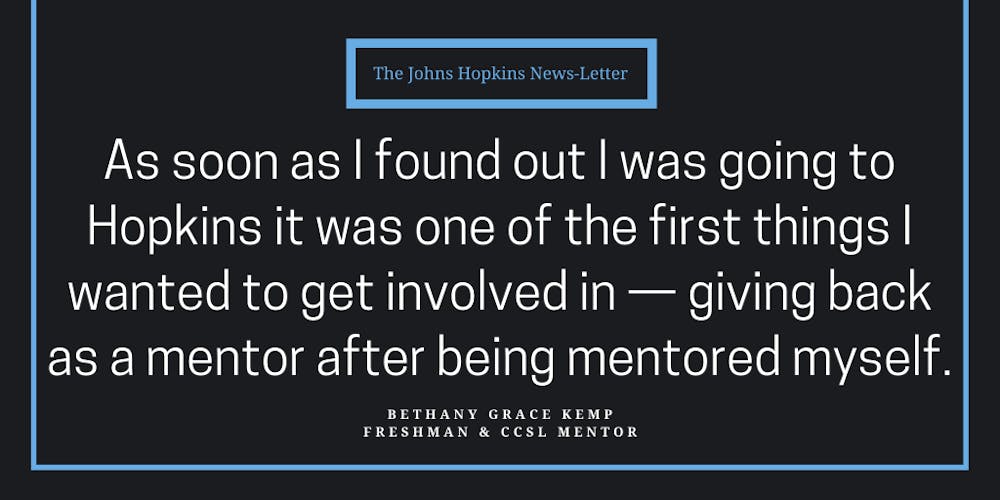Hopkins is known for the strength of its STEM curriculum and for the number of undergraduates immersed in some kind of scientific research on campus. Outside of the Homewood Campus, institutions like the Baltimore Underground Science Space, the Maryland Science Center and the National Aquarium make Baltimore an exciting place for scientific exploration.
Despite this, however, extra steps often need to be taken to ensure that these benefits and opportunities reach students in Baltimore’s public schools. This is where the Charm City Science League (CCSL) aims to help.
CCSL is a team of Hopkins students who mentor middle and high school students and prepare them to compete in Science Olympiad, a rigorous competition that requires students to commit to months of preparation.
Each Science Olympiad competition is divided up into events where students can demonstrate their skills in nearly all areas of STEM. Each school that registers for it can enter a team of 15 students who will cross-train for several different events.
By engaging in this kind of mentorship and academic support, CCSL helps students who are interested in STEM engage more fully in the sciences. This past year, they got to see first hand how their efforts can impact students when one of their mentees became a mentor.
Freshman Bethany Grace Kemp is a former student at Baltimore Polytechnic Institute. Kemp has been a “STEM person” her whole life, always gravitating towards engineering and math, but she didn’t start participating in Science Olympiad until her senior year at the advice of a teacher.
She looked through some of the Science Olympiad events and saw several topics she wanted to learn more about. Just a couple of months before receiving her Hopkins acceptance letter, this was how she first heard the name CCSL and, eventually, began forming relationships with student mentors just a few years older than her.
“I didn’t start doing Science Olympiad until my senior year and it was still really great getting the Hopkins mentors,” Kemp said in an interview with The News-Letter.
Mentors at CCSL helped her prepare for Science Olympiad events she found challenging.
“I was doing Designer Genes [which] I got a lot of help with every week,” Kemp recalled. “I felt like I had a much better grasp after each meeting about what I was learning.”
Kemp noted that CCSL mentors go above and beyond just preparing for events in the competition.
“They’re there to help us with whatever we need at the time. One student was studying for a chemistry exam and, even though it was completely unrelated to anything they were doing, [the mentors] were trying to be supportive of them,” she said.
The year that Kemp participated in Science Olympiad was her school's second year entering the competition. By that time, the number of students who participated had grown from six or seven members to a full team of 15 students, who spent the entire year studying for their specific events.
When she was finally able to compete in her five chosen events, Kemp said that the day was hectic.
“You’re studying for it the entire year and once you get to it, the day kind of flies by,” she said. “You’re always running around doing something.”
After her positive experience, Kemp knew she wanted to be involved in the organization that provided her with her first mentor even before she arrived on campus.
“As soon as I found out I was going to Hopkins it was one of the first things I wanted to get involved in — giving back as a mentor after being mentored myself,” she said.
She found CCSL at the Student Involvement Fair, submitted the application and completed an interview where her past experience as a mentee came into play.
“I was able to speak as someone who has been mentored before,” she said. “I feel like that was a unique opportunity most of the mentors haven’t had.”
In addition to helping her decide to become a mentor in college, Kemp said that her experience being mentored and competing in Science Olympiad helped her prepare for the structure of college classes.
“It had a big impact on independent learning and that’s kind of how college is,” she said, “You are not walked through every assignment. You have to do your own work to research beyond what you're given.”
Although the pandemic has halted this year’s olympiad and students are no longer physically at school, Kemp noted that the interest in Science Olympiad has increased — from one team of 15 during her year to two full teams this past year.
When operations resume, Kemp will be there. This time, she’ll be a mentor in the community she gained so much from.





